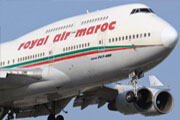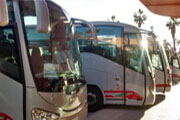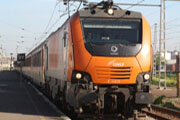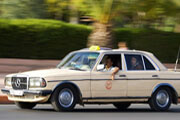Transport in Morocco
What you should know about transport in Morocco
Road infrastructure
National roads called 'Routes nationales' in French
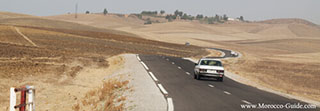
National roads are generally well maintained but narrow with heavy traffic. In 2009 the length of national, regional and provincial roads combined was 35,625 Miles (57,334 km).
Be careful: drivers of public transport (especially 'white taxi') have unpredictable and unwanted behavior: their primary goal is to maximize their profits by taking large risks. Always avoid them where possible.
If possible, always choose highways over National roads.
Highways called 'Autoroutes' in French
Moroccan highways are modern and good quality. As of 2012, Morocco numbered highways system has a total length of 1,012.83 Miles (1630 km) in addition of 466.64 Miles (751 km) of free expressway/freeway.
The speed limit for Moroccan Highways : 120 km/h (74.5 mph)
Be careful between Rabat and Casablanca : this highway is particularly busy between the Casa-Ain Sebaa and Casa Anfa exits.
It is preferable to avoid driving at night.
| Highway | Cities |
|---|---|
| A1 | Rabat - Kénitra - Larache - Asilah - Tanger |
| A2 | Rabat - Khémisset - Meknès - Fès - Taza - Guercif - Taourirt - Oujda |
| A3 | Rabat - Mohammedia - Casablanca |
| A4 | Tanger - Port Tanger Med |
| A5 | Casablanca - El Jadida |
| A6 | Fnideq - Tétouan |
| A7 | Casablanca - Settat - Marrakesh - Agadir |
The car fleet is mainly concentrated in Casablanca (34.56%) and Rabat (15.86%) which totals more than 50% of the Moroccan car fleet.
Railway
Trains are actually a very safe way to travel in Morocco. Train travel is also very affordable, although it is recommended to travel in First class as it provides air-conditioned carriages.
Rail Line
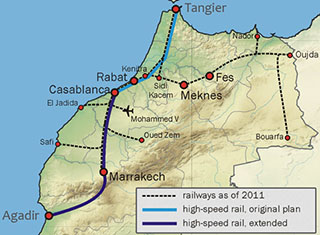
In 2009 the length Morocco's rail tracks was 1310 Miles (2109 km). ONCF (national state-owned railway company) manages and operates the Moroccan rail network.
The network for passenger transport is in the form of a link between the South (Marrakesh) to the East (Oujda) with links to Tangier, Safi, Oued Zem, El Jadida and Bou Aârfa.
ONCF provides travel by bus to the cities that are not yet served by the train network.
High-Speed Rail (TGV)
A new TGV line is under construction between Tangier and Casablanca. It will be operational in 2018 with TGV trains running at 320 km/h (200 mph).
Another TGV line between Casablanca and Marrakesh is planned and two other lines are in the pipeline : one between Marrakesh and Agadir and one between Casablanca and Oujda for 2030.
Tramway
Rabat (2 lines of 19km, opened 23 May 2011) and Casablanca (1 Line of 31km opened 13 Dec 2012).
You can download the tramway map here :
Air Travel
International Airports
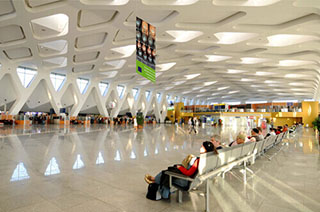
- Agadir (Al Massira)
- Al Hoceima (Cherif Al Idrissi)
- Casablanca (Mohammed V)
- Errachidia
- Essaouira - Mogador
- Fes - Saïss
- Laâyoune (Hassan I)
- Marrakesh (Menara)
- Nador - Al Aroui
- Ouarzazate
- Oujda (Angads)
- Rabat - Salé
- Tanger (Ibn Battouta)
- Tetouan (Sania R'mel)
Airlines In Morocco
A list of Airlines operating to Morocco :
- Royal Air Maroc - RAM (national state-owned company)
- Air France
- Jetairfly
- Air Arabia Maroc
- Vueling Airlines
- Ryanair
- easyJet
- Transavia
- Air Mediterranee
- Iberia
- Brussels Airlines
- Tunisair
- Lufthansa
- Alitalia
- TAP
- KLM
- Turkish Airlines
- British Airways
- Swiss
- Air Algerie
- Air Europa
- Luxair
Transportation in Morocco
Morocco has an efficient public transportation network, especially in the North (from Tangier to Marrakesh).
Advertisement
